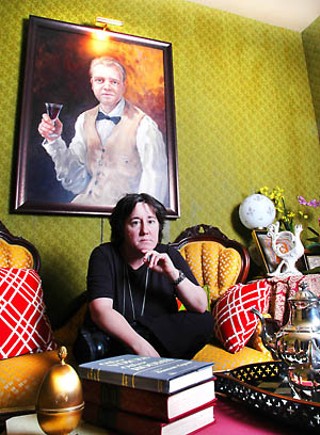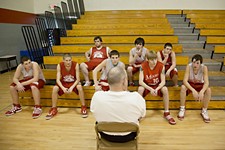The Movies That Matter
An interview with Killer producer Christine Vachon
By Marjorie Baumgarten, Fri., March 11, 2005

Look among the titles of the most daring and delirious American independent films of the past 15 years and you'll discover that a good number of them share one name in common: producer Christine Vachon. In just the past few years, the New York-based film producer and head of the production company Killer Films has produced the films Far From Heaven, Hedwig and the Angry Inch, Todd Solondz's Happiness and Storytelling (see "This Is a Love Story," for an interview with Solondz), One Hour Photo, and Boys Don't Cry, to name but a few.
Vachon got her start as a feature film producer in 1991 when she teamed up with Brown University alumni Todd Haynes and Barry Ellsworth to produce short films and eventually Haynes' first feature – and Sundance grand jury winner – Poison. She has gone on to produce all of Haynes' films: Safe, Velvet Goldmine, Far From Heaven, and his forthcoming "biopic that's not a biopic" about Bob Dylan. Other films include Tom Kalin's Swoon, I Shot Andy Warhol, Go Fish, and the notorious Kids. Vachon has also produced the first features of artists Larry Clark (Kids) and Cindy Sherman (Office Killer), and actors Ethan Hawke (Chelsea Walls) and Tim Blake Nelson (The Grey Zone). She has introduced us to the directing talents of film newcomers John Cameron Mitchell (Hedwig), Mary Harron (Warhol and the upcoming Ballad of Bettie Page), and Kimberly Peirce (Boys Don't Cry), and has recently worked on projects with veterans Robert Altman (The Company) and John Waters (A Dirty Shame).
Vachon wants to make movies that matter. She wants to and does. The title of her book (written with David Edelstein) is Shooting to Kill: How an Independent Producer Blasts Through the Barriers to Make Movies That Matter. She is no stranger to risk, controversy, and experimentation. The 40 or so films already bearing her name attest to that. Her work often seeps into the crevices between independent and commercial filmmaking. Some writers have called her the "Queen of the New Queer Cinema"; others associate her name with politically committed filmmaking. Even though some of her projects ultimately work out better than others (no names here), each film is worth having been made, worth having tried to meet its challenges, worth having dared.
Currently, Vachon is in Austin supervising production of Every Word Is True, a movie about Truman Capote and the period during which he wrote In Cold Blood. She accepted South by Southwest Film's invitation to be the subject of its retrospective this year before she knew that she would be concurrently filming in Austin. We visited her on the set and sat in a production trailer and talked about her career.
Austin Chronicle: Your career is so marvelous and vast. I'm wondering why these three particular movies were selected to screen at South by Southwest.
Christine Vachon: I didn't choose them. But, honestly, all three are wonderful. Hedwig and the Angry Inch, obviously, it's such a fabulous music movie that it seems completely appropriate to be here. And Swoon is only the second film I ever produced and it still really holds up. It'll be great to see it on the big screen. Of course, Far From Heaven ... any chance to see that projected, I think, is a real treat.
AC: Is that your most financially successful movie?
CV: I guess it depends on what you mean by financially successful. Because if you mean how much a movie cost – the ratio of how much it cost to how much it made – then the most financially successful movie I ever made is Go Fish, because that cost about $200,000 and it grossed well over $3 or $4 million. But my most financially successful movie in terms of millions is One Hour Photo, which made about $32 million domestic, I think.

AC: The commonalities among your films can be seen in their riskiness and transgressive qualities. Is this intentional? Is this what you naturally gravitate toward?
CV: I don't read a script and say, "Oh, this is really risky, therefore I want to do it." But I definitely feel that material which provokes me often might provoke others. My response is, "That'll be a really interesting thing to get on screen." I do a lot of true stories. Obviously, what we're here doing right now is ... I can't say it's a true story, but it's a version. That's certainly something that Killer does a lot, because when a crime really captures the public imagination, it's like the zeitgeist is holding up a mirror to itself. Swoon is a good example, because the Leopold and Loeb case happened in the Twenties and it continues to fascinate and obsess. It's been the subject of several films, and that whole notion of young people believing that their intellect lets them be above the law – it keeps repeating itself. Also in Swoon, there's the whole cultural re-examination from a contemporary perspective. Here's an interpretation of the relationship between the two boys that might not have crossed anyone's mind back in the Twenties.
AC: How does the past decade's influx of big-name stars to independent film affect projects from your perspective?
CV: Actors and their ability to finance movies, for better or worse, have come full center stage in the independent arena. Although, interestingly, when you really look at the so-called indie movies that really break records, they are the ones that don't have stars – like Napoleon Dynamite or The Blair Witch Project. Usually, an independent film really breaks out – not all the time, but frequently – when it simply is either going after an audience that is completely underserved: like Go Fish or earlier examples of gay filmmaking like The Living End or Poison. Or it's a voice that is so original and manages to strike a chord. I don't completely understand the chord that Napoleon Dynamite struck, but my nephews, who are young teenagers, can repeat every line, word for word. I think clearly there was some yawning hole that needed to be filled and somebody saw it.
AC: But why do you think that Napoleon Dynamite caught on and not Harold and Kumar Go to White Castle, which was released around the same time?
CV: I think if we could figure out the whys, then you'd be calling me at my house in the Bahamas or my island in Fiji, you know what I mean? In a way, that's the beauty of the business: that you cannot figure it out. You just cannot figure it out.
Companies/financiers will often say to me, "We've decided we want to start putting our money into more commercial movies." How do you define what's more commercial? Except for a tiny handful of stars – like Tom Cruise, Julia Roberts, and probably Sandy Bullock – those are the stars who can pretty much say, "I want to make this movie," and it pretty much gets made. But there's like five or six of them, you know. Everything else is total guesswork.
AC: What are your feelings about your unofficial title as the Queen of the New Queer Cinema?
CV: I think we're well past New Queer Cinema now. I've resisted that term for a long time and my association with it, not because I was trying to disassociate myself from things queer, but I did feel it was reductive to a lot of the movies. I also found myself in a bizarre position when I first started making movies. When I made Swoon, I was accused by a lot of gay groups of promoting negative images of gay people. After that, I was accused of only making movies for men. Then, when I made Go Fish, I was accused of making a movie about lesbians that didn't show enough older lesbians, younger lesbians, black lesbians, Asian, what have you. I just make what I want. To me, I Shot Andy Warhol – which is not considered a queer movie – is a fantastically feminist, fabulous film, even though what Valerie [Solanas] did was a terrible thing, and I don't think the film condones it in any way whatsoever. But those aren't the movies that you'd usually chalk up on one side or another. I'm a little nostalgic for those days when Swoon was being accused of promoting negative images. It was just such an interesting moment in popular culture. Basic Instinct was coming out then.

AC: And Silence of the Lambs.
CV: Exactly. And everyone was all up in arms about whether or not Jame Gumb was gay or not. Well, transvestites aren't gay. You know, we're at war now. Let's get serious. There are so many bigger issues facing us: legislation being passed every day curtailing our civil liberties as gay people and as straight people. We're in such a fucked-up mess. In a way it feels like "Oh, remember the days when that other stuff was important."
AC: As Killer Films has grown, the company has shifted from exclusively working with first-timers to now working with more seasoned professionals.
CV: We've helped lots of first-time directors become second-time directors, who have gone on to become third- and fourth-time directors. Doug McGrath, who is making Every Word Is True, this is his fourth film, but it's the first one we're doing with him. We definitely have a reputation that when we work with first-timers, we can support them effectively. And I don't want to stop. Working with first-timers is tough, because they really haven't done it before, and you find yourself in the position of explaining things to them that really seem elementary in the film world. However, I think, for example, of Boys Don't Cry: Just because Kim [Peirce] hadn't been on a feature-film set before didn't mean that she didn't know what she wanted. She needed to have an atmosphere and people around her that could help translate her vision to the screen. And what helped, and which I think is absolutely essential for a first-timer, she was very articulate. She knew what her vision was. That's what it comes down to. If a first-timer has a vision, I happily work with them. If they don't ... that's a problem whether they're a first-timer or a 10th-timer. It's all about really being able to construct a movie around a very strong vision.
AC: How do you find your role as a producer changing over the years?
CV: My role is different on every movie, because the director is different and the demands are different. Some directors need a lot more hand-holding than others. A lot of it is you've got to manage the production – the unit, as it were – then you've got to manage the actors; you've got to manage the studio and the studio's expectations. In some ways, not so much the bigger the budget, but the more suits involved – and I don't mean that in an insulting way – the more difficult it is. It becomes more about managing, making sure the process is protected. On Every Word Is True, Warner Independent Pictures has been very hands-off creatively. People want to make sure their investment is safe. It's a lot of money. I can't blame 'em.
AC: How have things changed now that you, personally, are at a different stage of your life?
CV: It's a wonderful thing about producing the kinds of movies I did in my 20s, because we felt the way, I guess, all 20-year-olds do: that we were inventing the process. Of course, we weren't. We were simply doing what people had been doing, I'd say, a good hundred years before us. We felt that what we were doing was so new and so extraordinary that it was if we were literally making history. Time will tell if we did. But it was really exhilarating to work those insanely long hours. To be on the set of a film like Poison was breathtaking.
And now, you know, it's hard to not sometimes feel beaten down by it. Producing is tough. There's a reason when you see a movie and there's a dozen producer credits on it – that actually one or two, usually about two, of those people listed there actually really sweated blood to get that thing on the screen. And the rest of them got credits because somebody insisted they had to or that was part of the deal or whatever. But that said, I sometimes do have to remind myself it's an amazing job. We get to make these incredible films, we get to work with extraordinary people. It's a wonderful way to make a living. I really can't complain.

AC: The subtitle of your book refers to making "movies that matter." What is it that makes a movie matter?
CV: That's a good question. There's some hubris in saying "movies that matter" – like, matters to who? One of the wonderful things that happens to me, I'd say about once a month in New York, is that somebody stops me on the street and says, "I love your movies. You made my favorite movie." And I never know what they're going to say. Sometimes they say Safe. Sometimes they say Kids. Sometimes they say Go Fish. Sometimes they say The Grey Zone. Sometimes they say Far From Heaven. I always stop expectantly when they say that because it's almost always something different. That's amazing. The idea that a movie can be the kind of movie that can be someone's favorite film is really extraordinary.
AC: What would you include in a new book?
CV: The last book – not by design, I mean I didn't know this was going to happen – was really Killer's first chapter, because the book ended right before Boys Don't Cry came out. Besides making more money than we had ever made, Hilary [Swank] won the Oscar ... and that catapulted us from Point A to Point Z. Besides her thanking Killer Films on live television, which is all fabulous, it brought us to attention in a way we never had been before. That little company in New York City that's making those weird little movies and just keeps making 'em. And suddenly people started to pay attention. Everything changed for us after that.
AC: What can you tell us about Every Word Is True?
CV: Doug McGrath brought the idea to us, I think, a good four years ago. He said [that he] would like to make a movie about Truman Capote, specifically about the time when he was writing In Cold Blood and how he managed to actually gain access to the town and the people's emotional lives. And he came down with Harper Lee, who had written To Kill a Mockingbird, although it hadn't come out yet. And then Capote's growing relationship with one of the killers, in particular, Perry Smith and the speculation – and that's all it's ever been – that Truman had a perhaps more physical relationship with Perry. So we optioned the material, and Doug began work on the script, although he had to take away time to go do Nicholas Nickleby. We worked with him developing each draft, et cetera.
I'm really enjoying working in Austin. The circumstances that brought us here are bizarre and convoluted and really don't make any sense. But we're here. Working with Anne Walker McBay [Richard Linklater's longtime producer, who is also working on Every Word Is True] has been really fun. It's great to feel like I'm in a city with a real film community.
We have a wonderful crew. We brought some people with us from New York, but that's because the director already had an artistic connection with them. The people we've been working with here have been wonderful. The locations are fabulous. Also, it's great to be somewhere where the food is good. We shot Boys Don't Cry in Dallas, and the food wasn't so good. ![]()
As part of SXSW Film 05's Christine Vachon Retrospective, Swoon screens at 10pm, Saturday, March 12, Alamo South Lamar; Hedwig and the Angry Inch at 10pm, Sunday, March 13, and 10pm, March 19, Alamo South Lamar; Far From Heaven at 10:45am, Tuesday, March 15, Alamo South Lamar. Also, Vachon will partake in a discussion at 11am, Sunday, March 13, in room 12AB of the Austin Convention Center.
RELATED LINKS:
Chronicle Reviews of movies produced by Christine Vachon:
Poison, Swoon, Go Fish, Postcards From America, Kids, Safe, Stonewall, I Shot Andy Warhol, Kiss Me, Guido, Office Killer, Happiness, Velvet Goldmine, Boys Don't Cry, Hedwig and the Angry Inch, Series 7: The Contenders, The Safety of Objects, Storytelling, The Grey Zone, One Hour Photo, Far From Heaven, Party Monster, Camp, The Company, A Home at the End of the World, A Dirty Shame
Film News (December 24, 2004)
Every Word Is True: Austin lands a Killer production
Interviews with Todd Haynes:
Far From Heaven (November 22, 2002)
Todd Haynes resurrects the gloriously overwrought weepies of the Fifties
Inside Out: Special Guest Todd Haynes (September 12, 2003)
Haynes shorts shown at Cinematexas












